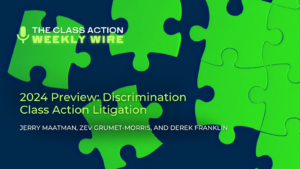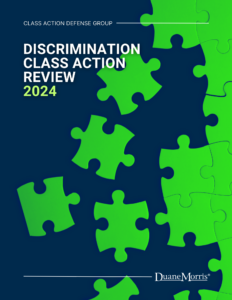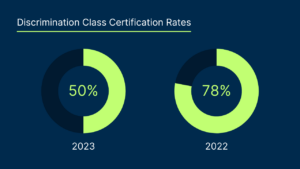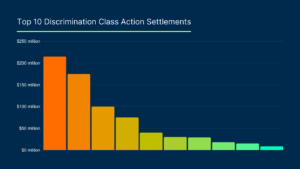Duane Morris Takeaway: This week’s episode of the Class Action Weekly Wire features Duane Morris partner Jerry Maatman and associates Zev Grumet-Morris and Derek Franklin with their discussion of 2023 developments and trends in discrimination class action litigation as detailed in the recently published Duane Morris Discrimination Action Review – 2024.
Check out today’s episode and subscribe to our show from your preferred podcast platform: Spotify, Amazon Music, Apple Podcasts, Google Podcasts, the Samsung Podcasts app, Podcast Index, Tune In, Listen Notes, iHeartRadio, Deezer, YouTube or our RSS feed.
Episode Transcript
Jerry Maatman: Welcome to our listeners – thank you for being here for our weekly podcast, the Class Action Weekly Wire. My name is Jerry Maatman, I’m a partner at Duane Morris, and joining me today are my colleagues, Derek Franklin and Zev Grumet-Morris. Thanks for being here guys.
Derek Franklin: Thank you, Jerry, happy to be part of the podcast.
Zev Grumet-Morris: Thanks, Jerry. Glad to be here.
Jerry: Today on the podcast we’re discussing the recent publication of our Practice Group, the 2024 edition of the Duane Morris Discrimination Class Action Review. Listeners can find the e-book publication on our blog, the Duane Morris Class Action Defense Blog. Derek, could you provide our listeners with a summary of what that publication is all about?
Derek: Absolutely, Jerry. Class action litigation in the discrimination space remains an area of key focus of skilled class action litigators in the plaintiffs’ bar. As a result, compliance with discrimination laws in the myriad of ways that companies interact with employees, customers, and third-parties is a corporate imperative. To that end, the class action team at Duane Morris is pleased to present the Discrimination Class Action Review – 2024. This publication analyzes the key discrimination-related rulings and developments in 2023, as well as the significant legal decisions and trends impacting discrimination class action for 2024. We hope that companies and employers will benefit from this resource in their compliance with these evolving laws and standards.
Jerry: Thanks, Derek. In 2023, courts around the country issued a mixed bag. I’ve always thought that discrimination class actions strike at the very brand and reputation of corporations. Zev, what are some of the takeaways from the publication with regard to major developments in 2023?
Zev: So for decades, federal courts routinely granted class certification in nationwide employment discrimination class actions. But this changed in large part over a decade ago, when the U.S. Supreme Court decided Wal-Mart Inc. v. Dukes, et al., where the court tightened the legal requirements for securing class certifications. But the pendulum appears to be swinging back, as courts are becoming increasingly inclined to find for plaintiffs in class certification rulings within the discrimination context. In 2023 alone, courts granted class certification 50% of the time, while of course denying certification in the other 50% of cases.
Jerry: The discrimination class action space is certainly evolving and reflecting societal trends. Derek, what do you foresee corporate counsel can expect for the coming year in 2024?
Derek: Ultimately, as the class action landscape continues to evolve, so, too, are the playbook theories of the plaintiff and defense bars. Counsel on both sides are becoming more sophisticated and creative in their approaches to prosecuting and defending class actions. Courts are facing increasing pressure to quickly and efficiently discern between properly pled actions and meritless litigation, not only to promote court expediency, but also to spare businesses the incredible expense that accompanies class action defense. So while workplace and quality continues to grab headlines and remain the forefront in the public eye, employers can expect discrimination class actions to reach even greater heights in 2024.
Jerry: Well, thanks for that information – key and important for corporate counsel trying to get ahead of these litigation risks. Of course, conversion of the filing of a discrimination class action into a certified class and then into a settlement, is the Holy Grail for the plaintiffs’ bar. Zev, how did the plaintiffs do in terms of that conversion rate in 2023 with respect to settlement amounts?
Zev: Plaintiffs did very well in securing high settlement dollars. In 2023, the top 10 discrimination settlements totaled $762.2 million, which was a significant increase over 2022, when the top 10 discrimination class action settlements totaled only $597 million.
Jerry: It will be interesting to see in 2024 if we cross the $1 billion line in this area – it seems like these settlements are on an upward trend in aiming for that $1 billion dollar mark. Certainly an important statistic that we track here at Duane Morris in terms of our analysis of class action rulings and class action settlements. Well, thank you, Derek, and thank you, Zev, for being here today, and thank you to our loyal listeners for tuning in. You can get your free copy of the Discrimination Class Action Review e-book on our website – free of charge.
Zev: Thanks for having me, Jerry, and thank you to all the listeners.
Derek: Yeah, thanks so much, everyone!




